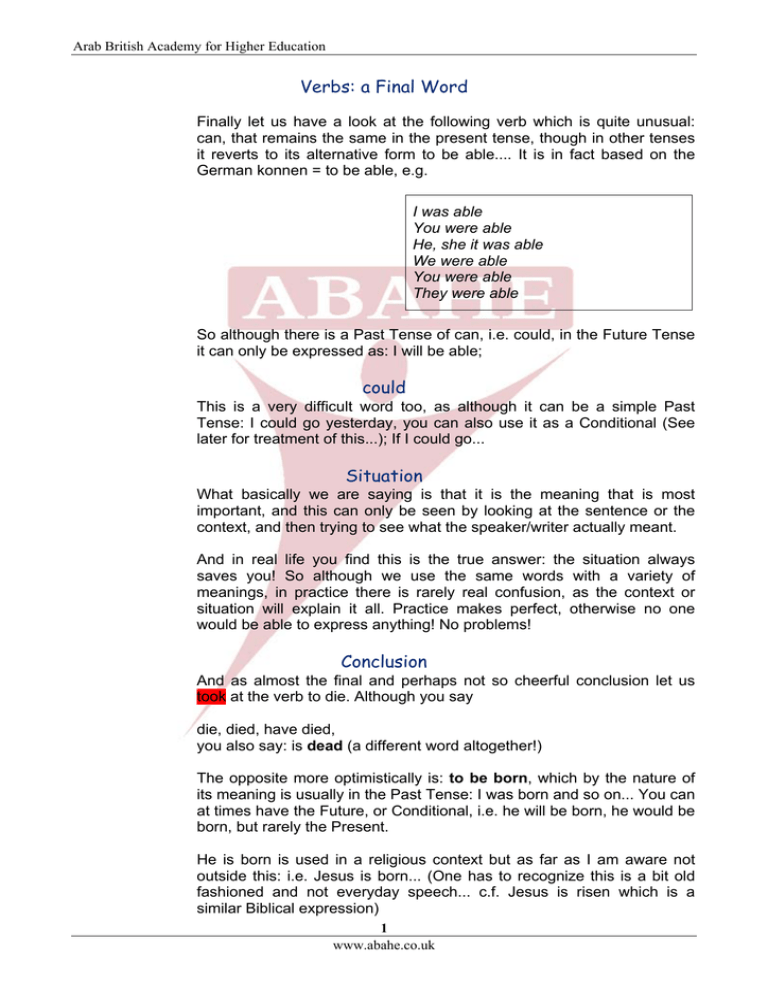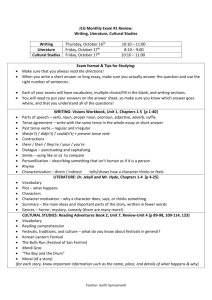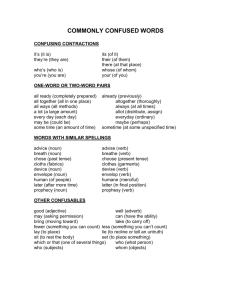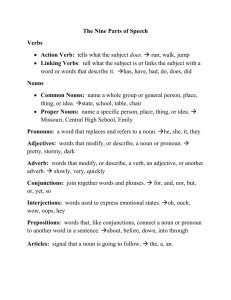
Arab British Academy for Higher Education
Verbs: a Final Word
Finally let us have a look at the following verb which is quite unusual:
can, that remains the same in the present tense, though in other tenses
it reverts to its alternative form to be able.... It is in fact based on the
German konnen = to be able, e.g.
I was able
You were able
He, she it was able
We were able
You were able
They were able
So although there is a Past Tense of can, i.e. could, in the Future Tense
it can only be expressed as: I will be able;
could
This is a very difficult word too, as although it can be a simple Past
Tense: I could go yesterday, you can also use it as a Conditional (See
later for treatment of this...); If I could go...
Situation
What basically we are saying is that it is the meaning that is most
important, and this can only be seen by looking at the sentence or the
context, and then trying to see what the speaker/writer actually meant.
And in real life you find this is the true answer: the situation always
saves you! So although we use the same words with a variety of
meanings, in practice there is rarely real confusion, as the context or
situation will explain it all. Practice makes perfect, otherwise no one
would be able to express anything! No problems!
Conclusion
And as almost the final and perhaps not so cheerful conclusion let us
took at the verb to die. Although you say
die, died, have died,
you also say: is dead (a different word altogether!)
The opposite more optimistically is: to be born, which by the nature of
its meaning is usually in the Past Tense: I was born and so on... You can
at times have the Future, or Conditional, i.e. he will be born, he would be
born, but rarely the Present.
He is born is used in a religious context but as far as I am aware not
outside this: i.e. Jesus is born... (One has to recognize this is a bit old
fashioned and not everyday speech... c.f. Jesus is risen which is a
similar Biblical expression)
1
www.abahe.co.uk
Arab British Academy for Higher Education
Activity 1
Nouns (See Key at the end). Please name the type of noun in the list below:
and say whether each is masculine, feminine, neuter, or abstract.
Liverpool; capital; flock; cleanliness; (a) lie; Tommy; girls
Activity 2
Verbs: Please answer the questions below. In the following sentences
identify which words are the verbs, and which the pronouns.
a) The express train arrived early at the busy station.
b) Have you brought your bag with you?
c) He went out at 9.30 this morning.
d) The journey took me at least one and a half hours.
e) Peter has been to the pictures twice this week
Activity 3
Rewrite the above sentences in the Present Tense: you can use the space
below:
a)
b)
C)
d)
e)
Key
2
www.abahe.co.uk
Arab British Academy for Higher Education
Activity One
Liverpool = Proper Noun; neuter
capital = Common Noun, neuter
flock = Collective Noun; gender unclear, as a mixture, could be male or
female...
cleanliness = Abstract Noun, no gender.
a lie = Abstract Noun, again no gender
Tommy = Proper Noun, male (masculine)
Girls = Common Noun, female, (feminine)
Activity Two
(a)
Verb = arrived;
No pronoun
(b)
Verb = have; (strictly brought is not a verb but a Past Participle, part of
the Present Perfect Tense. Have is known as an Auxiliary Verb as in this
type of sentence, i.e. one with the Past Tense, have cannot stand by
itself but needs the Past Participle to make complete sense...
Pronoun: you (twice)
(c)
Verb = went out (in English we have a lot of verbs consisting of more
than one word; out is called a Preposition, see later section for more
about Prepositions...)
Pronoun = he
(d)
Verb = took
Pronoun = me
(e)
Verb = has; (been = Past Participle)
No Pronoun
Activity Three
a)
b)
c)
d)
e)
The express train arrives early at the busy station.
Are you bringing your bag with you? (This is quite difficult as in the
Present you have to use the Continuous form)
He goes out at 9.30 this morning.
The journey takes me at least one and a half hours.
Peter goes (is going) to the pictures twice this week.
(This again is tricky as has been is another way of saying: has gone...
The point always to remember is that meaning rules more than the look
of the word.)
3
www.abahe.co.uk
Arab British Academy for Higher Education
All Rights Reserved © Arab British Academy for Higher Education
4
www.abahe.co.uk








